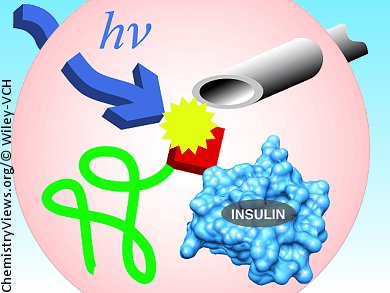Insulin is a pancreatic hormone which regulates the carbohydrate metabolism by stimulating the uptake of glucose from the blood circulation. Its pathological absence or its malfunctioning cause metabolic diseases, such as diabetes. These conditions are treated with exogenous insulin, which needs to be injected multiple times per day, thus representing a burden for the patients.
Piyush Jain and colleagues, University of Missouri, USA, developed a system to improve the delivery of this hormone. The researchers modified insulin by introducing 1-(4,5-dimethoxy-2-nitrophenyl)ethyl (DMNPE)-azide moieties and covalently attached the modified insulin to a rink amide poly(ethylene glycol) resin via a photocleavable linker. In doing so, the scientists obtained a subcutaneous, photoactivated insulin depot which releases the hormone when illuminated with a light-emitting diode.
Although this system can be further optimized using a biodegradable resin, it can efficiently deliver insulin at appropriate times and amounts.
- Construction of a photoactivated insulin depot,
P. K. Jain, D. Karunakaran, S. H. Friedman,
Angew. Chem. Int. Ed. 2013, 53 (5), 1404–1409.
DOI: 10.1002/anie.201207264




